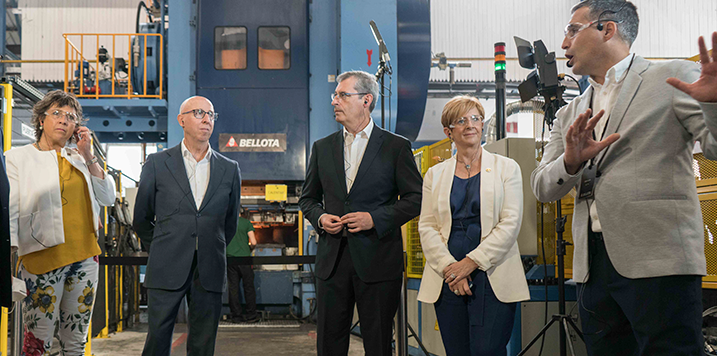 19 May, 2022
19 May, 2022The company Bellota Herramientas has invested almost 4 million euros in a new hoe manufacturing line for its Legazpi plant, thus enabling it to double the output on this new automated line, which will produce both hoes and hammers.
The new line will be capable of manufacturing over 250 references and go from an output of 4,000 hoes per day in Legazpi to manufacturing 7,200 hoes of varying types and models per day when the installation reaches full production capacity at the end of the year. The new line will effectively enable the company to add a manufacturing shift, going from the current two shifts to three. It will also enable hammer manufacturing to be doubled, going from 2,000 hammers manufactured daily at this plant, to 4,000 per day.
Catering to the European market
With this production increase, Bellota will be in a position to respond to the growing demand for these products in Africa and the Middle East, and will offer a more sustainable, competitive and consistently high-quality product. Production will largely be sold to countries in southern Europe, north Africa, the Middle East and Latin America. Hoes are Bellota Herramientas’ top-selling product, other than trowels, representing 15% of its sales, while hammers account for 12% of overall sales. The aim with the new line is to increase sales of these product families by 40%.
The new line brings significant benefits. Firstly, it will enable Bellota to double its production capacity, while also allowing the tool manufacturer to manufacture more sustainably and energy efficiently.
In fact, the new line shows a commitment to the circular economy approach, since it will also reduce the percentage of steel wasted during the process by approximately 13%. Furthermore, it will also reduce consumption of raw materials, since it will require less material to manufacture the tool and will cut down on electricity consumption during the manufacturing process by reducing the number of blows needed to form the piece. In fact, the new machinery will improve energy efficiency and reduce energy consumption overall by around 20%. This will in turn improve worker safety, since it cuts out one of the repetitive mechanical steps of the manufacturing process.
Tooling manufacture: at the core
This is all made possible thanks to the incorporation of five robots, a new induction furnace and another five machines that form part of the new manufacturing line, without making changes to staffing. From an employment standpoint, the new machines will cut down on certain mechanical tasks and this will result in greater safety and ergonomics for the worker. The new line will also bring a substantial boost in productivity (providing greater flexibility through short production series and quick tooling changes, introducing Industry 4.0 concepts: predictive maintenance, quality consistency, etc.). This all means a significant conceptual change in order to be able to manufacture more flexibly, competitively and with higher western quality, safety and sustainability standards.
The automation of the new line and the incorporation of new tooling designed and fully manufactured by Bellota Herramientas and its new change system will enable, for instance, shorter runs of tools to be manufactured and immediately replaced (in an adjustment time of less than ten minutes) with new tooling that will enable other models of hoes and hammers to be produced.
Tooling systems are fundamental elements in factories because they are subject to wear and tear and they need to have a quick response. The quality of the product and quick response depends on them, so tooling manufacture is key in production.
Subscribe to our newsletter. Just insert your e-mail and you will receive the latest news.